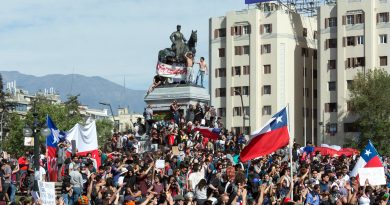FOCUS on Public Diplomacy Conflicts – Mexico and Ecuador
Sofia A. Diaz
Staff Writer
Tensions between Mexico and Ecuador escalated on April 5, when Ecuadorian police invaded the Mexican Embassy in Quito. Jorge Glas, the former Ecuadorian Vice President, was arrested while taking refuge in the embassy after being convicted on accounts of corruption and bribery, leading to the diplomatic ties between the two countries being suspended.
Ecuadorian police stormed the Mexican Embassy and reportedly broke through the external doors to substantiate Glas’s arrest, says The Associated Press. Glas had been seeking asylum in the embassy since December after receiving the convictions.
Alicia Bárcena, the Mexican Secretary of Foreign Relations, posted to X later that evening stating that several diplomats suffered from injuries due to the break-in. She also asserted her belief that this event was a violation of the Vienna Convention on Diplomatic Relations, The Associated Press continues.
Diplomatic institutions such as embassies are protected under the Vienna Convention, as they are recognized to be part of ‘foreign soil’ and legally should not be infringed upon by the state where they are established. This protection extends as far as considering the illicit entering of law enforcement agencies to be a violation.
Mexican President Andrés Manuel López Obrador announced the breaking of diplomatic ties with Ecuador, alongside Bárcena’s post on X citing the violation of the Vienna Convention. On the following Monday, the Obrador declared the immediate removal of diplomatic personnel from the embassy. He confirmed his plans to take Ecuador to the International Court of Justice (ICJ) “to denounce Ecuador’s responsibility for violations of international law,” according to Al Jazeera.
There have been many occurrences where foreign embassies have been illegally breached; however, those instances were often at the hands of insurgent groups, such as in the cases of Thailand, Indonesia, Argentina, or Libya. However, in the case of Ecuador, the event was coordinated and approved at the government level, which has led to significant international outrage.
Matthew Miller, spokesperson for the U.S. Department of State, stated that “the United States condemns any violation of the Vienna Convention on Diplomatic Relations, and takes very seriously the obligation of host countries under international law to respect the inviolability of diplomatic missions,” reports ABC News. Miller further urged the two countries to resolve the issue and attempt to rekindle diplomatic ties.
Despite the substantial amount of criticism directed towards Ecuadorian authorities for their violation of the Vienna Convention and international law, there were some who declared their support for Glas’s capture.
On the evening of the attack, former Ecuadorian Ambassador Jorge Icaza told The Associated Press that despite his acknowledgment of the entry being illegal, he felt it was justified, later adding that it is not appropriate to provide protection to “a criminal who was sanctioned by the Ecuadorian justice (system) in two very evident cases, which is also negative from the point of view of international standards.”
Gabriela Sommerfeld, the current Foreign Minister of Ecuador told The Associated Press reporters on Saturday that the decision to illegally enter the embassy was made by President Daniel Noboa after exhausting measures to diplomatically solve the issue with Mexican authorities and deemed Glas to be an “imminent flight risk.”
Glas was transported on Saturday from the office of the attorney general in Quito to Guayaquil, where he remains in a maximum-security prison, reports PBS News. The former Vice President is being further investigated by authorities regarding alleged irregularities during his management of certain reconstruction efforts following the 2016 earthquake that resulted in the deaths of hundreds of Ecuadorians in addition to his conviction on charges of corruption and bribery, says ABC.
Analysts are questioning whether the raid was a strategic move for political gain in an attempt to sway the upcoming election. The New York Times notes that President Noboa has endured flagged approval ratings amid an increase of violence just weeks before a referendum was scheduled. This referendum can affect his prospects for re-election next year. Analysts believe that Noboa’s hopes for re-election could have been a driving factor for Glas’s arrest.
On April 11, Mexico brought its case against Ecuador to the ICJ, asking them to issue emergency measures to secure the embassy and suspend Ecuador’s membership to the United Nations until they issue a public apology for the raid. Reuters reports that court filings released by the ICJ stated that “a public apology recognizing its violations to the fundamental principles and norms of international law, to guarantee the reparation to the moral harm inflicted upon the United Mexican States and its affected nationals” is necessary.
The Mexican Embassy in Quito remained under heavy surveillance and police security after the raid and will remain heavily secured until the removal of diplomatic personnel has been completed.
Image courtesy of Getty Images

